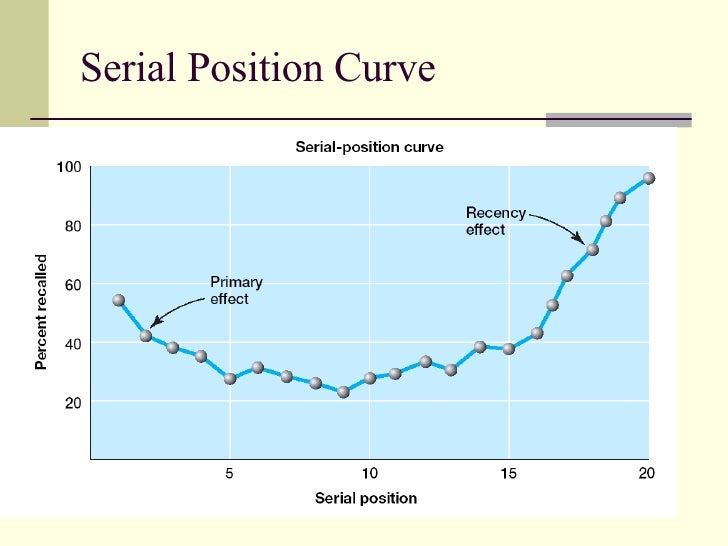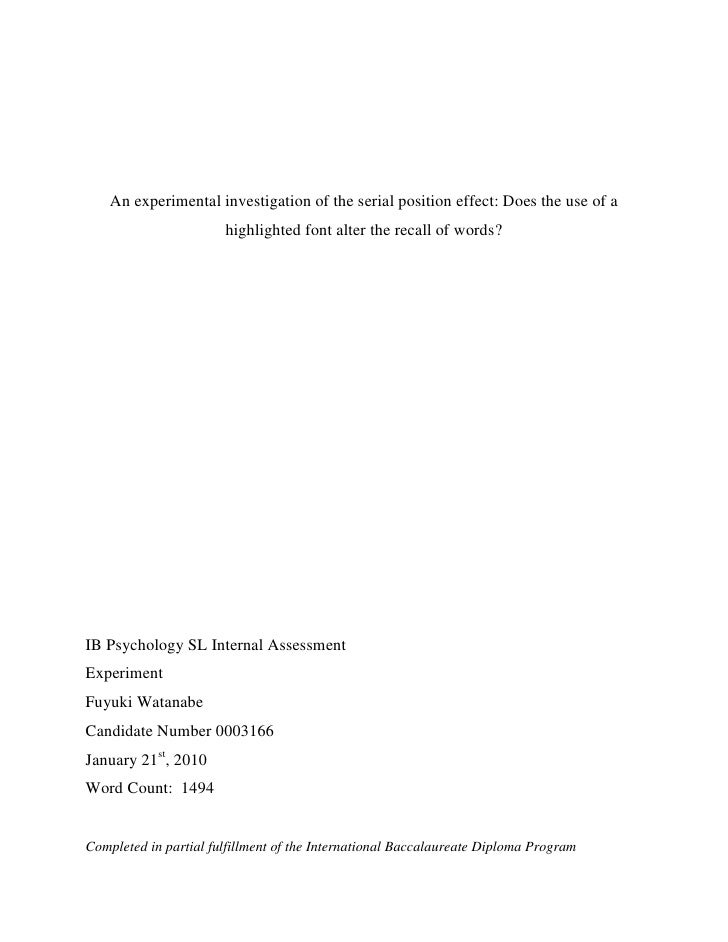Glanzer And Cunitz Serial Position Effect
This is known as serial position effect. In a nutshell, when participants remember primary and recent information, it is thought that they are recalling information from two separate stores STM and LTM. Delaying recall by 30 seconds prevented the recency effect. Glanzer and Cunitz – ibmynotes.
- Glanzer And Cunitz 1966 Serial Position Effect Pdf
- Glanzer And Cunitz Serial Position Effect Study
- Primacy Position Effect
- Glanzer and Cunitz Glanzer and Cunitz (1966) Aim: To investigate recency effect in free recall (i.e. In any order). Procedure: This was a laboratory experiment where participants first heard a list of items and then immediately had to recall them in any order.
- Introduction This experiment lacks ecological validity as this memorization of the items does not present everyday ways of utilizing memory unless they were memorizing phone numbers, shopping lists etc Also it lacks reliability as the participants were all male and may possibly.
Glanzer And Cunitz 1966 Serial Position Effect Pdf
An Investigation into the Primacy - Recency (Serial Position) Effects on Memory Abstract The general topic area is memory. The research is based on the primacy recency effect, by Murdock, (1962) and Glanzer and Cunitz, (1966). Aim: To investigate whether there is a relationship between the serial position effect, the position of words in a list and the amount of words freely recalled from that list. Alternative hypothesis: There will be a significant relationship between the serial position effect, the position of words in a list and the amount of words freely recalled from the list. Null hypothesis: There will be no significant relationship between the serial position effect, the position of words in a list and the amount of words freely recalled from the list. The research method was experimental with the design being repeated measures - sampling method was opportunity sampling.


More words were remembered at the beginning (a mean number of 10) and at the end of the word list (a mean number of 9.3). The middle words were the least remembered with a mean number of 7.9 and the alternative hypothesis was accepted. This research supports the primacy recency effect and the research carried out by Murdock, Glanzer and Cunitz. Introduction: Registration, Storage and Retrieval are the three main processes in memory. Registration consists of the sense organs detecting information and placing it firmly into the memory system which is stored securely. Storage involves the process in which the information in the memory can be recovered.
Glanzer And Cunitz Serial Position Effect Study
Atkinson and Shiffrin both thought that memory consisted of the three memory stores which were a sensory store; a short-term store and a long-term store. They believed that when a stimulus makes contact with our sense organs, the information passes from the sensory store into the short-term store and then into the long-term store. New information will always go through this process, however, some will be lost during this process. Murdock (1962) showed participants a list of words at a rate of about one per second. They were asked to free recall as many as possible. The results showed that: “The probability of recalling any word depended on its position in the list (its serial position).
Participants typically recalled those items from the end of the list first and got more of these correct than earlier items (the recency effect). Items from the beginning of the list were recalled quite well relative to those in the middle (the primacy effect), but not as well as those at the end.
Primacy Position Effect
Poorest recall is for items in the middle of the list. The serial position effect holds regardless of the length of the list.” It is presumed that the primacy effect occurs because items at the start of the list have been rehearsed several times before being transferred to the long-term memory store where they are recalled. It is also believed that the recency effect happens because items currently in the short-term memory store are recalled from there. The last items are only remembered if recalled and tested straight away after the experiment. Glanzer and Cunitz (1966) removed the recency effect in the variation of Murdock’s study, by delaying the recall of a list of words for 30 seconds and delayed rehearsal. They found that if recall is delayed, the recency effect disappears, but the primacy effect remains. Usually the words in the middle of a list are lost completely from the memory system or are just not available at that time for recall.

By understanding the multi-store model of memory, we assume that this is due to the short-term memory’s limited amount of space and time limit for information to be held there, which means new information could displace the old, unless rehearsed by the individual before. Aim: To investigate whether there is a relationship between the serial position effect, the position of words in a list and the amount of words freely recalled from that list. Hypothesis: Alternative Hypothesis: There will be a significant relationship between the serial position effect, the position of words in a list and the amount of words freely recalled from the list. Null Hypothesis: There will be no significant relationship between the serial position effect, the position of words in a list and the amount of words freely recalled from.